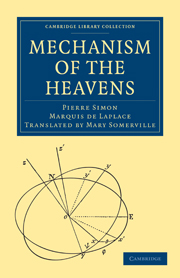PRELIMINARY DISSERTATION
Published online by Cambridge University Press: 29 August 2010
Summary
In order to convey some idea of the object of this work, it may be useful to offer a few preliminary observations on the nature of the subject which it is intended to investigate, and of the means that have already been adopted with so much success to bring within the reach of our faculties, those truths which might seem to be placed so far beyond them.
All the knowledge we possess of external objects is founded upon experience, which furnishes a knowledge of facts, and the comparison of these facts establishes relations, from which, induction, the intuitive belief that like causes will produce like effects, leads us to general laws. Thus, experience teaches that bodies fall at the surface of the earth with an accelerated velocity, and proportional to their masses. Newton proved, by comparison, that the force which occasions the fall of bodies at the earth's surface, is identical with that which retains the moon in her orbit; and induction led him to conclude that as the moon is kept in her orbit by the attraction of the earth, so the planets might be retained in their orbits by the attraction of the sun. By such steps he was led to the discovery of one of those powers with which the Creator has ordained that matter should reciprocally act upon matter.
- Type
- Chapter
- Information
- Mechanism of the Heavens , pp. v - xlviPublisher: Cambridge University PressPrint publication year: 2009First published in: 1831



